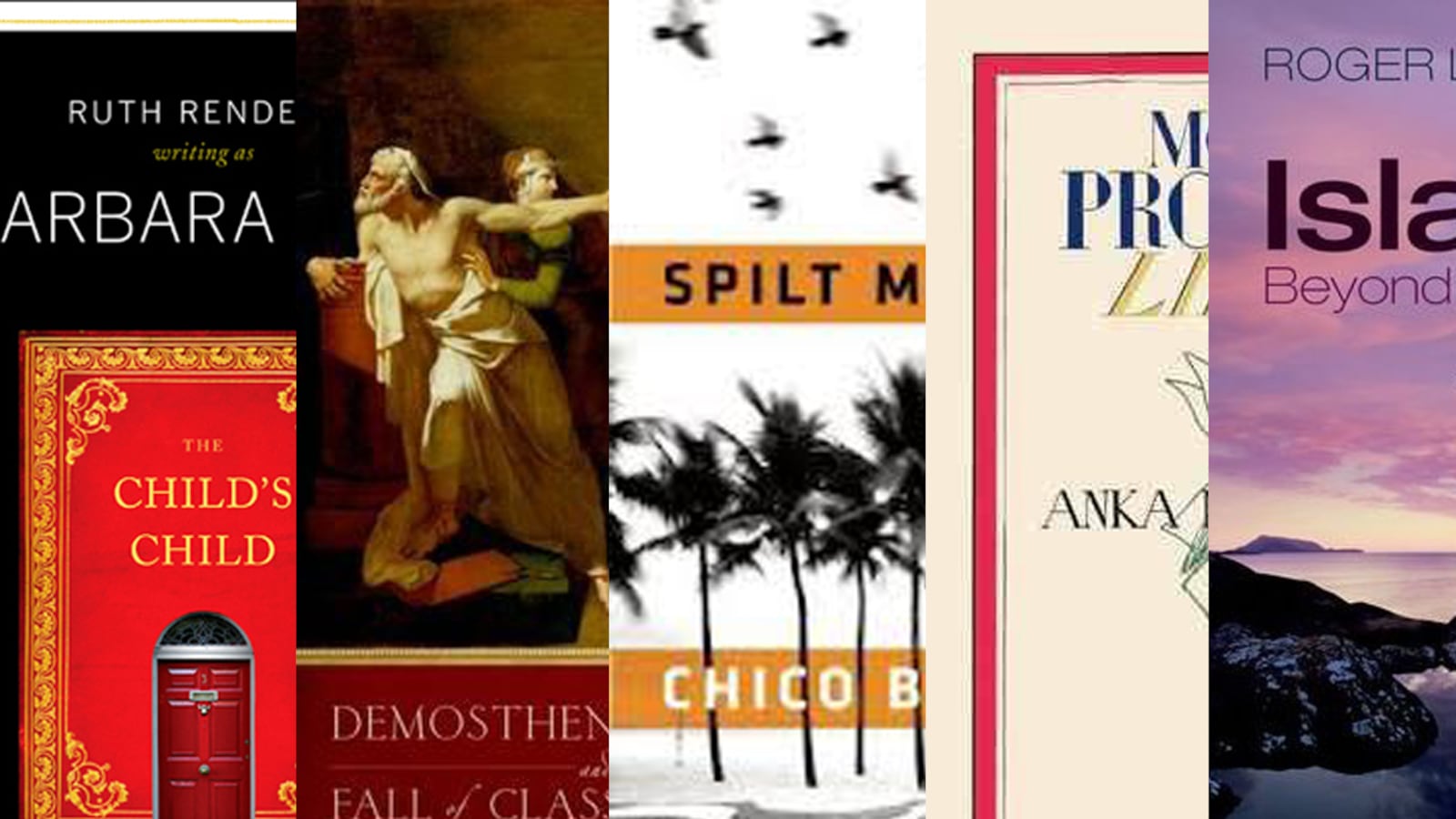The Child’s ChildBy Barbara Vine
Ruth Rendell, writing as Vine, puts a ‘manuscript’ about a 1930s gay brother and a pregnant sister inside the narrative of a similar modern-day sibling pair.

“There’s small choice in rotten apples.” That’s Shakespeare. Ruth Rendell, whether writing her mystery novels or molting into Barbara Vine and burrowing deep into réalité intérieure, has always written thoughtful novels on the consequences of our choices—on how we make decisions and how certain acts, whether of violence or adultery, haunts us. But what if our choices are illusions, the range within all possible permutations limited by our internal obsessions and external norms, all of which make rotten apples? In her new novel, Rendell give us two stories (a novel within a novel), the first one of which is set in modern-day England: Grace is a Ph.D. candidate writing her dissertation on the similarities between the persecution of two groups of people: gays and women who bear illegitimate children, the latter of which constitutes a little genre of its own that allows Rendell/Vine to blow affectionate kisses at George Eliot’s Adam Bede, Hardy’s Tess of the d’Urbervilles, and Elizabeth Gaskell’s Mary Barton. One night, Grace sleeps with the attractive but immature and irritating James, the boyfriend of her dear brother Andrew, and becomes pregnant. The novel then “reprints” an unpublished manuscript that Grace came across while conducting her research—a book called, well, The Child’s Child, about a 1930s brother-sister pair who decides to pretend to be a husband-wife pair, because John is gay and Maud, who is resentful and apathetic, is carrying an illegitimate daughter. The pre-war narrative dominates the entire book like an elephant sitting on a python, and you wish Grace’s story was allotted its breathing room. Because although the obvious interpretation is one of contrast—look at all the choices that weren’t available to John and Maud but available to Andrew and Grace—the far more promising viewpoint, hinted at but not allowed to rise, is how the same degree of worry and despair haunts Grace, Andrew, Maud and John. We might believe that we’ve come quite far as a civilization, but we are heirs of all eternity. That, too, is Shakespeare.
Monsieur Proust’s LibraryBy Anka Muhlstein
The author of ‘Balzac’s Omelette’ offers another sensual appreciation of a classic author, this time submitting to the books that Proust loved.

When a friend wondered how Proust could translate the writing of the art critic John Ruskin from English, a language he did not know, Proust answered: “I do not claim to know English. I claim to know Ruskin.” You don’t absolutely need to know In Search of Lost Time to read Muhlstein’s brisk little volume, a mini-biography that dissects the many literary influences of that “last great historian of the loves … of the Heartbreak House of capitalist culture; [who] dominates the scene and plays host in the mansion where he is not long to be master,” as the critic Edmund Wilson called him. He is still our master, as the continual complete submission to Proust’s tour of the human landscape shows. It is enriching, then, to discover whom Proust’s masters were, and how they show up in the vast symphony of In Search of Lost Time. “Proust seemed incapable of creating a character without putting a book in his hands. Two hundred characters inhabit the world he imagined, and some sixty writers preside over it,” Muhlstein inventories. Who pointed Proust down Swann’s Way (which is the Méséglise Way) and merged it with the Guermantes Way? Baudelaire and Mallarmé, of course, but the man who plays an even bigger part was Ruskin, who could extract an entire cosmos from one little figure, a few inches high, amidst hundreds of minuscule figures within the portal of the Booksellers at the Rouen Cathedral. In Proust’s obituary of Ruskin he confessed that upon rereading Ruskin’s passage about Rouen, he was seized with a desire to see “the little man he speaks of,” and in In Search of Lost Time you might recall the famous passages about the church spires of Martinville. He might have been bedridden inside a cork-lined room, but Proust never hesitated in allowing fine words—even English words that he did not fully know—to bear his imagination away. Proust was the model reader, and In Search of Lost Time is the model literature to read.
Islands Beyond the Horizon By Roger Lovegrove
A naturalist inspiringly introduces 20 of the world’s most remote places, all of which he has had the fortune of landing on, like a compulsive Crusoe.

What draws us to islands? “Our island solitude, unsponsored, free,” as Wallace Stevens put it. Roger Lovegrove, who was director of the Royal Society for the Protection of Birds in Wales for 27 years, has had the luck of landing, like a compulsive Crusoe, on 20 of the most remote islands in the world. “The intimacy of the competing elements of land and sea,” he offers, might be a reason. “There is a feeling of being in a privileged world of one’s own,” he writes. “An island can paradoxically offer a feeling of both security as well as isolation; its boundaries are narrow and firmly defined.” If that sounds like psychotherapy, then I say, by all means, Mr. Lovegrove, analyze the hell out of the rocks. He writes on the “impossibly icebound” Wrangel Island north of the Siberian coast, the site of the world’s largest population of Pacific walrus (upwards of 100,000) and the greatest concentration of polar bears (sadly, only some 500 females). Jan Mayen Island, northwest of Iceland, is a monochromatic “waste clinker and ash heap from a furnace” where bleached skulls and bones testify to the wholesale slaughter of whales. As it happens, “in considering the reasons for the declining fortunes of long-established wildlife communities on islands throughout the world—inhabited or uninhabited—no factor has been of greater consequence than the arrival of European man.” Next time, before you decide to be whisked away to a slither of lava teething in the earth’s ocean, ask yourself if you really need to be there—especially if you can just read this joyful book.
Spilt MilkBy Chico Buarque and Alison Entrekin (translator)
A rambling 150-year-old man hazily recounts his colorful life in this slim novel by one of Brazil’s greatest musicians.

Our first fiction-writing ancestors had many motives, but it is not difficult to imagine one of them laying on his or her deathbed and overcome by an imperative to put down the events of a life. In this short novel, Buarque puts his subject, Eulálio d’Assumpção, in a Rio de Janeiro hospital bed and has him narrate his family’s past while hitting on nurses and complaining about his food. Even if you factor in the fantastical aspect that Eulálio is 150 years old, this is somewhat an aspiration toward an aesthetic essence, distilling fiction to what is irreducible. No surprise, then, that Eulálio sounds like a Beckett mumbler, as if his morphine drip was really filled with a purified language concentrate. Eulálio rambles on about his grandfather, a radical abolitionist plantation owner in the colonial empire; his father, a fearful senator in Parliament who snorted cocaine in the Swiss Alps; his cinnamon-skinned wife Matilde, whom he falls in love with when he sees her singing as a choir girl at his father’s funeral, “her hair was wet against her naked back, but now I am dreaming already.” That slip from unreliable recollection to flat-out fantasy showcases Buarque’s effortless rhythm—no surprise, as Buarque is an elder statesman of bossa nova, and a legend for his subversive opposition to Brazil’s brutal military dictatorship, jailed briefly and twice fled in exile. The technique does seem to drone on like a one-note samba, but perhaps we can think of Spilt Milk as a prose equivalent of a Barnett Newman painting—the irritating outbursts and hallucinations about his crazy daughter end up being the strips that measures, divides, and shapes the sweep of colorful narratives that pours out of Eulálio. The trance of Eulálio’s fictional memoir even has Newman’s ritualistic, icon-making spirit in it. Eulálio ends up being an idol, a wraith who, at 150, is not quite dead and not quite living.
Demosthenes of Athens and the Fall of Classical GreeceBy Ian Worthington
The eventual suicide of the orator Demosthenes symbolizes Greek democracy’s struggles against the mighty Macedonian empire.

“To the victor went the prize of Greece,” writes Worthington, a professor of history at the University of Missouri, in the opening page of his narrative on the decline of the world’s only ancient democracy. On one side of the pitch was the fierce orator and statesman Demosthenes, who tried, first, to lead a ragtag band of Athenians, and then, a loose coalition of Greek polis against the mighty army of Philip II of Macedonia, who stood on the other side of the plain of Chaeronea in ancient Boeotia. An ineffective, bickering democracy faced off against a prosperous monarchy that moved “with a speed and determination that left the Greeks breathless.” Demosethenes’s struggles and eventual suicide, after a failed revolt following Alexander the Great’s death, reminds us that democracy is not necessarily the norm nor the endpoint of the evolution of political states, but a strange contract that is fragile. Freedom might be slow and irritating, as any follower of the fiscal cliff madness can agree on. Or it might even be crushing and tragic if it proceeds without a responsible level of institutional checks and controls, as the heartbreaking Newtown massacre shows. It might be meek, and fiercely fought over, compared to the fearful stability and dominance of monarchies and one-party regimes. But freedom is a beautifully brittle spirit balancing on a narrow strip of the intellectual spectrum. It must be cherished.





